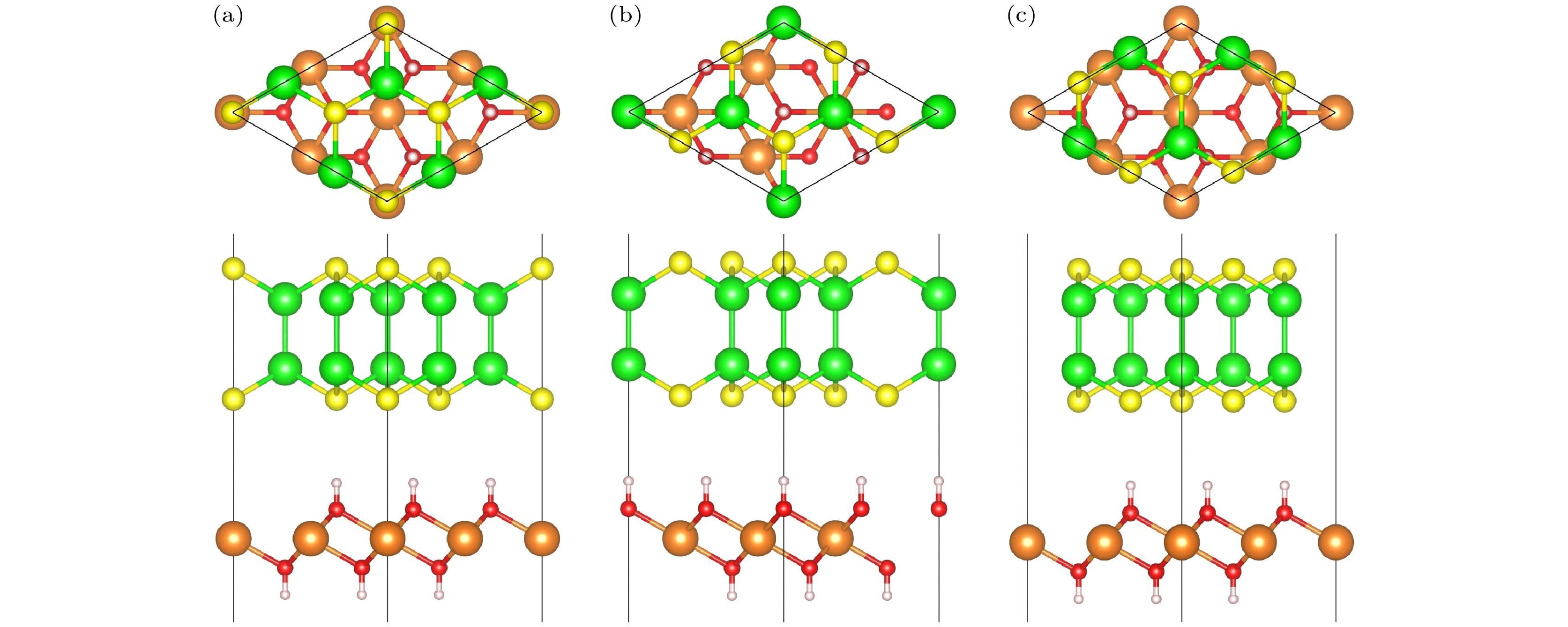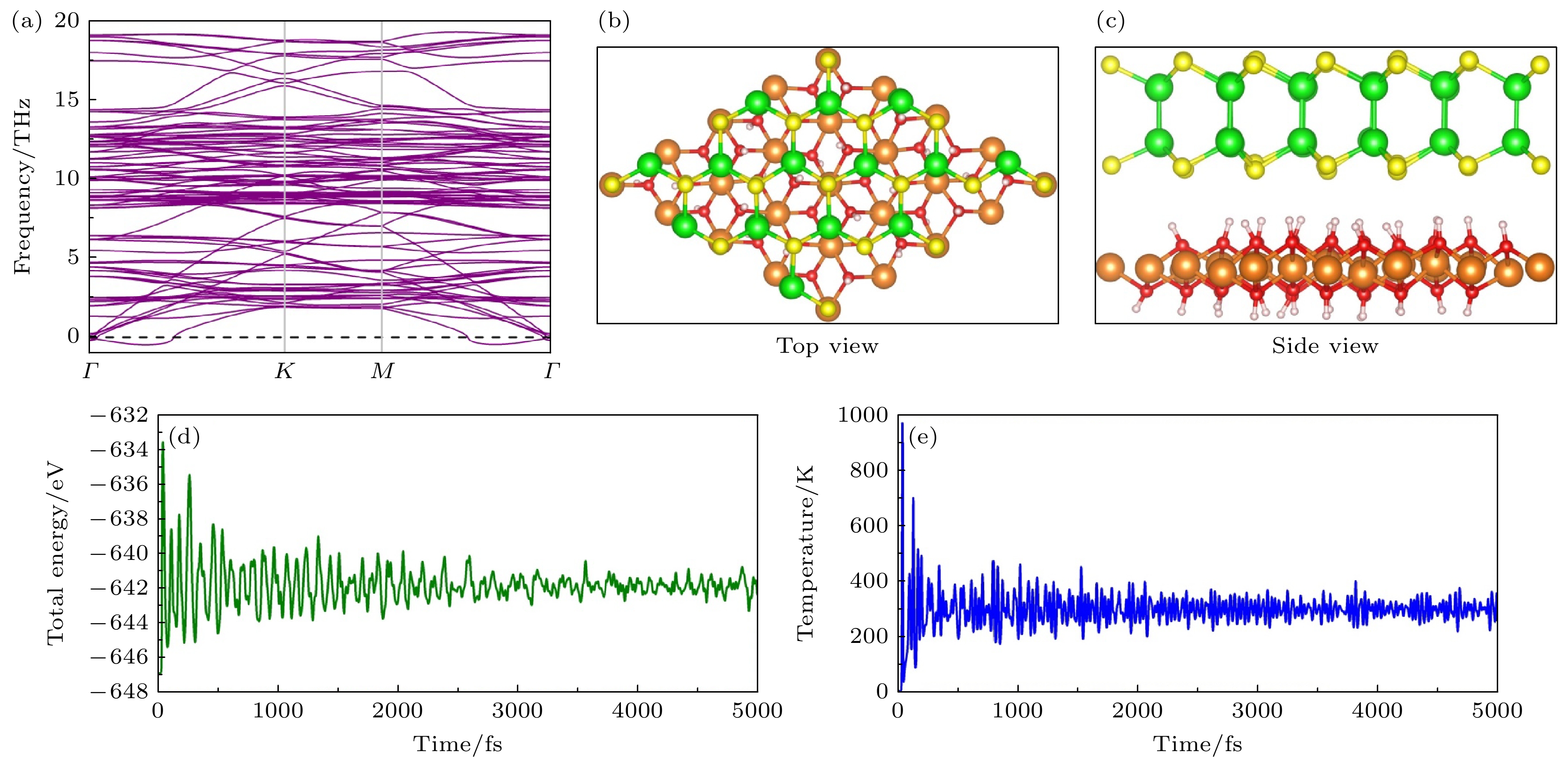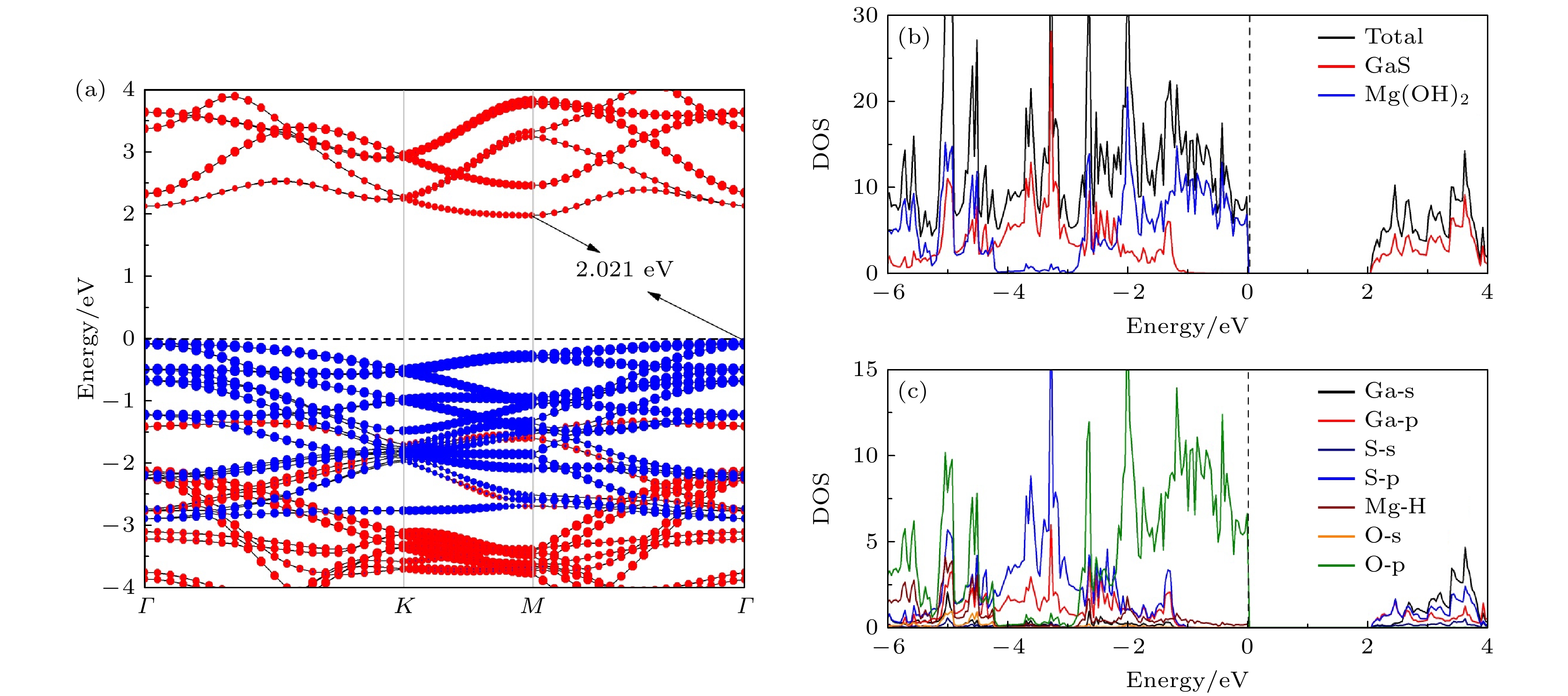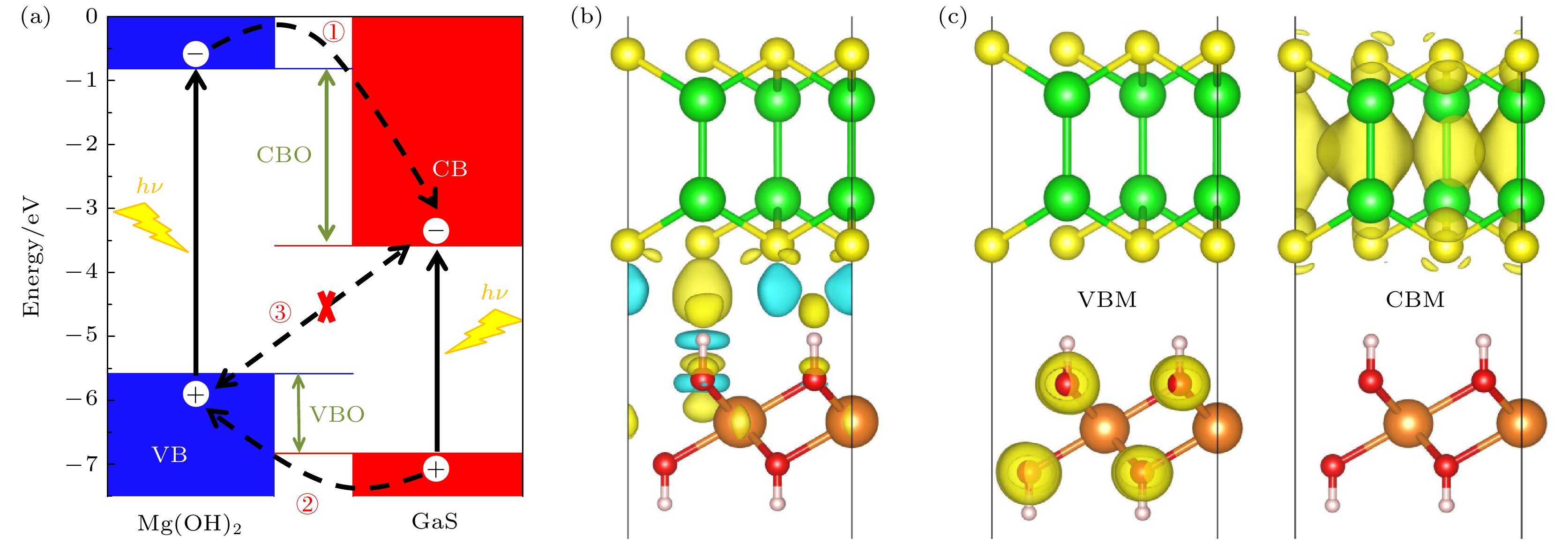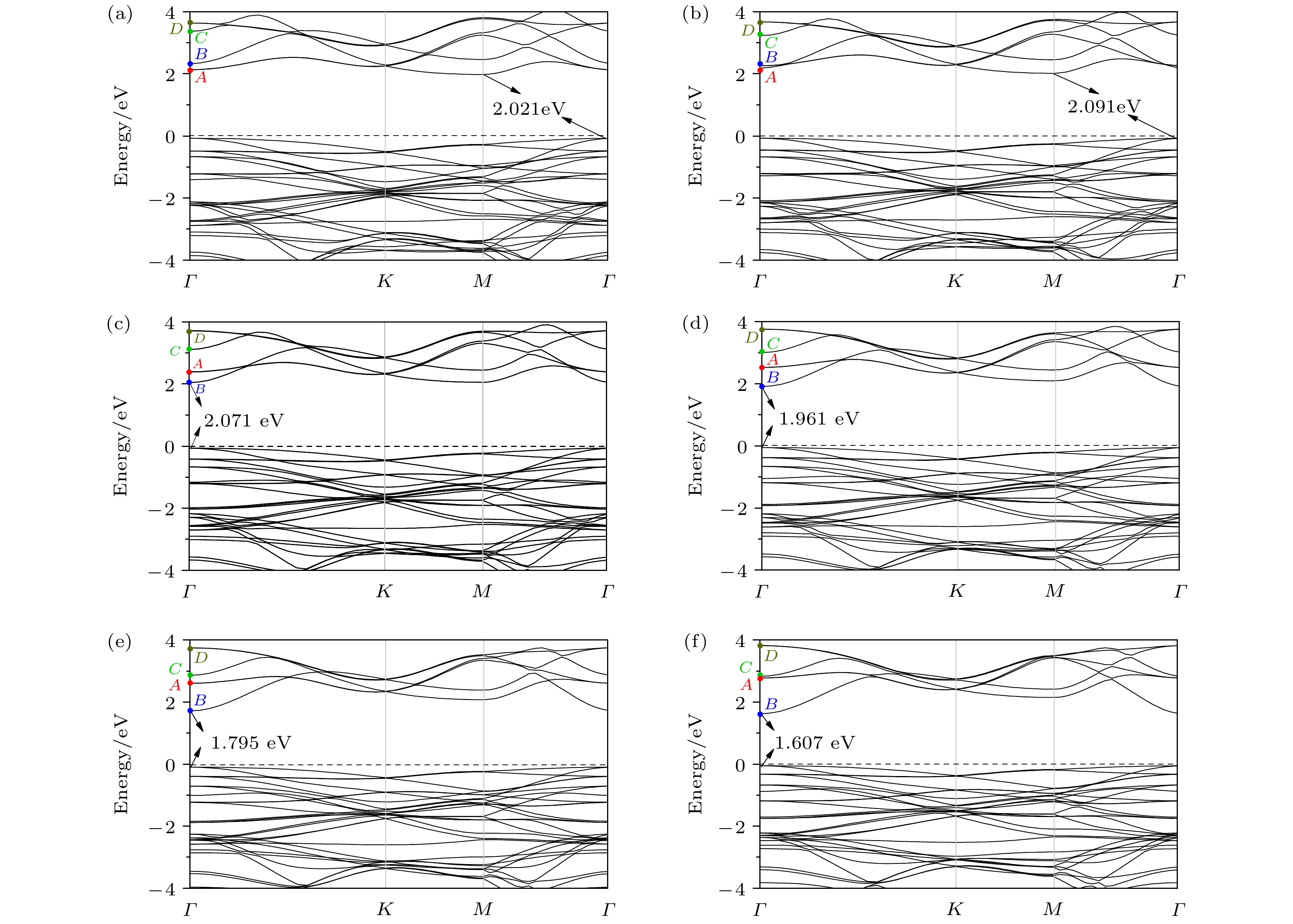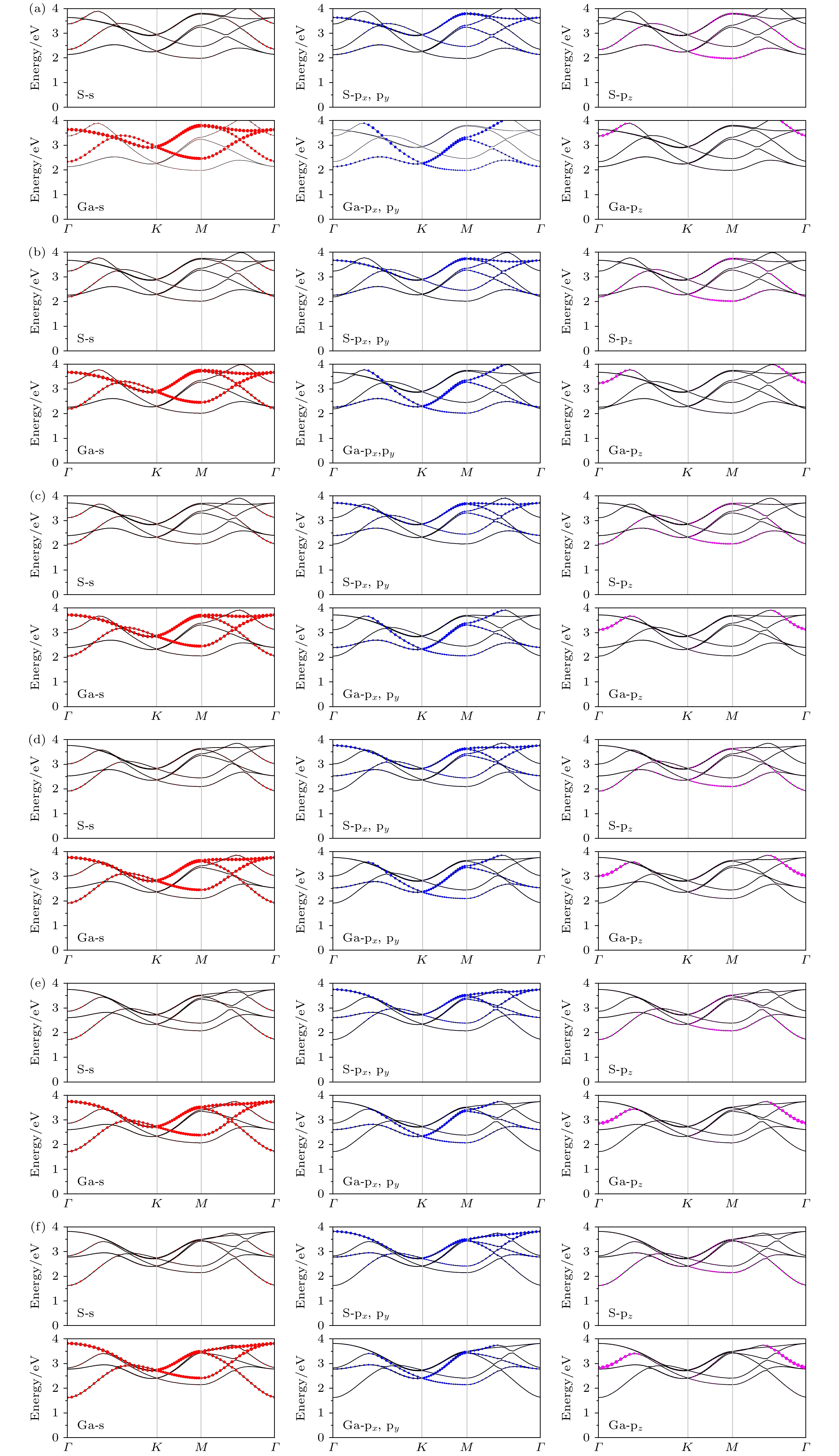-
基于第一性原理计算方法研究了GaS/Mg(OH)2异质结的稳定性、电子和光学性质. 结果表明, GaS/Mg(OH)2异质结具有较小的晶格失配率, 负的结合能和热力学稳定性而容易构建. 异质结的带隙有效降低至2.021 eV, 而且具有Type-II型能带结构, 有利于光生电子-空穴对的空间分离. 层间电荷转移诱导的内建电场进一步促进载流子的分离, 同时有助于抑制层间电荷的复合. 在双轴应变下, 异质结的导带最小值和价带最大值的位置分别产生了不同程度的平移, 导致带隙发生显著的变化, 变化量达到了0.5 eV. 而且在拉伸应变下, 异质结由间接转变为直接带隙半导体, 同时异质结仍保持Type-II型能带结构. 此外, 应变还可以有效地调控异质结的带边位置与水分解的氧化还原电位相匹配(pH = 0—7). 光吸收谱显示异质结具有较强的光吸收性能, 尤其在拉伸应变为3%时, 光吸收发生了明显的红移. 这些结果表明, GaS/Mg(OH)2异质结具有可调的电子性能而在光电领域有着广阔的应用前景.Constructing Type-II heterostructure is an effective scheme to tailor the electronic structure and improve the application performance. Motivated by recently successful syntheses of Mg(OH)2 and GaS monolayers, we investigate the stability, electronic, and optical properties of GaS/Mg(OH)2 heterostructure by using the density functional theory method. The calculated results show that GaS/Mg(OH)2 heterostructure is easily constructed due to its small lattice mismatch, negative binding energy, and thermodynamic stability. Compared with monolayer materials, the GaS/Mg(OH)2 heterostructure has a band gap that effectively decreases to 2.021 eV and has Type-II band structure, facilitating the spatial separation of photo-generated carriers where electrons are localized in the GaS and holes reside in the Mg(OH)2 monolayers. The built-in electric field induced by the interlayer charge transfer points from GaS to Mg(OH)2 monolayer, which can further improve the separation and suppress the recombination of electron-hole pairs. Under the biaxial strain, the valance band maximum and conduction band minimum of GaS/Mg(OH)2 heterostructure shift in the downward direction to different extents, resulting in obvious change of band gap, with the change reaching about 0.5 eV. Furthermore, the band structure of GaS/Mg(OH)2 heterostructure can be transformed from indirect band gap semiconductor into direct band gap semiconductor under the tensile strain, while GaS/Mg(OH)2 heterostructure maintains Type-II band structure. Additionally, the band edge positions of GaS/Mg(OH)2 heterostructure can also be effectively adjusted to cross the redox potentials of water decomposition at pH = 0–7. The light absorption spectra show that GaS/Mg(OH)2 heterostructure has stronger light absorption capability than the constituent monolayers. Especially, the light absorption has an obvious redshift phenomenon at a tensile strain of 3%. These findings indicate that the GaS/Mg(OH)2 heterostructure has a wide range of applications in the field of optoelectronics due to the tunable electronic properties, and also provides some valuable insights for future research.
-
Keywords:
- heterostructure /
- electronic structure /
- strain /
- first-principle methods
[1] Guo Y T, Yi S S 2023 Materials 16 5798
 Google Scholar
Google Scholar
[2] Radisavljevic B, Radenovic A, Brivio J, Giacometti V, Kis A 2011 Nat. Nanotechnol. 6 147
 Google Scholar
Google Scholar
[3] Xia J, Huang X, Liu L Z, Wang M, Wang L, Huang B, Zhu D D, Li J J, Gu C Z, Meng X M 2014 Nanoscale 6 8949
 Google Scholar
Google Scholar
[4] Pospischil A, Furchi M M, Mueller T 2014 Nat. Nanotechnol. 9 257
 Google Scholar
Google Scholar
[5] Lukatskaya M R, Mashtalir O, Ren C E, Dall’Agnese Y, Rozier P, Taberna P L, Naguib M, Simon P, Barsoum M W, Gogotsi Y 2013 Science 341 1502
 Google Scholar
Google Scholar
[6] Wang Y S, Yu X Q, Xu S Y, Bai J M, Xiao R J, Hu Y S, Li H, Yang X Q, Chen L Q, Huang X J 2013 Nat. Commun. 4 2365
 Google Scholar
Google Scholar
[7] Fu C F, Sun J Y, Luo Q Q, Li X X, Hu W, Yang J L 2018 Nano Lett. 18 6312
 Google Scholar
Google Scholar
[8] Zhao P, Ma Y D, Lü X S, Li M M, Huang B B, Dai Y 2018 Nano Energy 51 533
 Google Scholar
Google Scholar
[9] Guo H Y, Zhao Y, Lu N, Kan E J, Zeng X C, Wu X J, Yang J L 2012 J. Phys. Chem. C 116 11336
 Google Scholar
Google Scholar
[10] Wang H, Zhang J J, Hang X D, Zhang X D, Xie J F, Pan B C, Xie Y 2015 Angew. Chem. 127 1211
 Google Scholar
Google Scholar
[11] Tao S D, Xu B, Shi J, Zhong S Y, Lei X L, Liu G, Wu M S 2019 J. Phys. Chem. C 123 9059
 Google Scholar
Google Scholar
[12] Zhong H X, Xiong W Q, Lü P F, Yu J, Yuan S J 2021 Phys. Rev. B 103 085124
 Google Scholar
Google Scholar
[13] Niu X H, Li Y H, Shu H B, Yao X J, Wan J L 2017 J. Phys. Chem. C 121 3648
 Google Scholar
Google Scholar
[14] Li H, Tsai C, Koh A L, Cai L, Contryman A W, Fragapane A H, Zhao J H, Han H S, Manoharan H C, Abild-Pedersen F, Nørskov J K, Zheng X L 2016 Nat. Mater. 15 48
 Google Scholar
Google Scholar
[15] Qian G L, Xie Q, Liang Q, Luo X Y, Wang Y X 2023 Phys. Rev. B 107 155306
 Google Scholar
Google Scholar
[16] Zhang M Z, Tang C M, Cheng W, Fu L 2021 J. Alloy. Compd. 855 157432
 Google Scholar
Google Scholar
[17] Wang X L, Quhe R, Cui W, Zhi Y S, Huang Y Q, An Y H, Dai X Q, Tang Y A, Chen W G, Wu Z P, Tang W H 2018 Carbon 129 738
 Google Scholar
Google Scholar
[18] Sen R, Jatkar K, Johari P 2020 Phys. Rev. B 101 235425
 Google Scholar
Google Scholar
[19] Huang W J, Gan L, Li H Q, Ma Y, Zhai T Y 2016 Cryst. Eng. Comm 18 3968
 Google Scholar
Google Scholar
[20] Hu P A, Wang L F, Yoon M, Zhang J, Feng W, Wang X N, Wen Z Z, Idrobo J C, Miyamoto Y, Geohegan D B, Xiao K 2013 Nano Lett. 13 1649
 Google Scholar
Google Scholar
[21] Jie W J, Chen X, Li D, Xie L, Hui Y Y, Lau S P, Cui X D, Hao J H 2015 Angew. Chem. Int. Ed. 54 1185
 Google Scholar
Google Scholar
[22] Wang Z X, Xu K, Li Y C, Zhan X Y, Safdar M, Wang Q, Wang F M, He J 2014 ACS Nano 8 4859
 Google Scholar
Google Scholar
[23] Mudd G W, Svatek S A, Ren T, Patane A, Makarovsky O, Eaves L, HBeton P, Kovalyuk Z D, Lashkarev G V, Kudrynskyi Z R, Dmitriev A I 2013 Adv. Mater. 25 5714
 Google Scholar
Google Scholar
[24] Late D J, Liu B, Luo J, Yan A, Matte H S S R, Grayson M, Rao C N R, Dravid V P 2012 Adv. Funct. Mater. 24 3549
 Google Scholar
Google Scholar
[25] Kouser S, Thannikoth A, Gupta U, Waghmare U V, Rao C N R 2015 Small 11 4723
 Google Scholar
Google Scholar
[26] Wang B, Kuang A L, Luo X K, Wang G Z, Yuan H K, Chen H 2018 Appl. Surf. Sci. 439 374
 Google Scholar
Google Scholar
[27] Lin Z L, Lin T T, Lin T J, Tang X, Chen G J, Xiao J Y, Wang H Y, Wang W L, Li G Q 2023 Appl. Phys. Lett. 122 131101
 Google Scholar
Google Scholar
[28] Shin G H, Lee G B, An E S, Park C, Jin H J, Lee K J, Oh D S, Kim J S, Choi Y K, Choi S Y 2020 ACS Appl. Mater. Interfaces 12 5106
 Google Scholar
Google Scholar
[29] Yin H J, Tang Z Y 2016 Chem. Soc. Rev. 45 4873
 Google Scholar
Google Scholar
[30] Suslu A, Wu K, Sahin H, Chen B, Yang S, Cai H, Aoki T, Horzum S, Kang J, Peeters F M, Tongay S 2016 Sci. Rep. 6 20525
 Google Scholar
Google Scholar
[31] Wang J B, Zhang N, Wang Y H, Zhao H S, Chen H M, Zeng H T, Zhao L J, Yang Q, Feng B Y 2024 Int. J. Hydrogen Energ. 53 247
 Google Scholar
Google Scholar
[32] Xiong W Q, Xia C X, Du J, Wang T X, Zhao X, Peng Y T, Wei Z M, Li J B 2017 Phys. Rev. B 95 245408
 Google Scholar
Google Scholar
[33] Wang F, Cui A Y, Sun H M, Zhou B, Xu L P, Jiang K, Shang L Y, Hu Z G, Chu J H 2019 J. Alloy. Compd. 785 156
 Google Scholar
Google Scholar
[34] Kresse G, Furthmüller J 1996 Comp. Mat. Sci. 6 15
 Google Scholar
Google Scholar
[35] Perdew J P, Burke K, Ernzerhof M 1996 Phys. Rev. Lett. 77 3865
 Google Scholar
Google Scholar
[36] Grimme S 2006 J. Comput. Chem. 27 1787
 Google Scholar
Google Scholar
[37] Monkhorst H J, Pack J D 1976 Phys. Rev. B 13 5188
 Google Scholar
Google Scholar
[38] Heyd J, Scuseria G E, Ernzerhof M 2003 J. Chem. Phys. 118 8207
 Google Scholar
Google Scholar
[39] Zhuang H L, Hennig R G 2013 Chem. Mater. 25 3232
 Google Scholar
Google Scholar
[40] Jung C S, Shojaei F, Park K, Oh J Y, Im H S, Jang D M, Park J, Kang H S 2015 ACS Nano 9 9585
 Google Scholar
Google Scholar
[41] Wang B J, Li X H, Cai X L, Yu W Y, Zhang L W, Zhao R Q, Ke S H 2018 J. Phys. Chem. C 122 7075
 Google Scholar
Google Scholar
[42] Luo Y, Wang S K, Ren K, Chou J P, Yu J, Sun Z M, Sun M L 2019 Phys. Chem. Chem. Phys. 21 1791
 Google Scholar
Google Scholar
[43] Ren K, Yu J, Tang W C 2019 J. Appl. Phys. 126 065701
 Google Scholar
Google Scholar
[44] Kumar R, Das D, Singh A K 2018 J. Catal. 359 143
 Google Scholar
Google Scholar
[45] Tang W, Sanville E, Henkelman G 2009 J. Phys. : Condens. Matter. 21 084204
 Google Scholar
Google Scholar
[46] Bai K F, Cui Z, Li E L, Ding Y C, Zheng J S, Liu C, Zheng Y P 2020 Vacuum 180 109562
 Google Scholar
Google Scholar
[47] Lou J B, Ren K, Huang Z M, Huo W Y, Zhu Z Y, Yu J 2021 RSC Adv. 11 29576
 Google Scholar
Google Scholar
[48] Gajdoš M, Hummer K, Kresse G, Furthmüller J, Bechstedt F 2006 Phys. Rev. B 73 045112
 Google Scholar
Google Scholar
-
图 4 (a) GaMg-HS的投影能带结构, 红色和蓝色能带由GaS和Mg(OH)2单层贡献; (b), (c) GaMg-HS的总态密度和投影态密度(费米能级用虚线表示)
Fig. 4. (a) Projected band structure for GaMg-HS, the bands plotted in red and blue indicate the bands are dominated by GaS and Mg(OH)2 monolayers, respectively; (b), (c) the total and projected density of states for GaMg-HS (Fermi level is indicated by a dashed line).
图 5 (a) GaMg-HS界面电荷分离机制示意图; (b) GaMg-HS的差分电荷密度图, 黄色和青色区域分别代表电子积累和消耗; (c) GaMg-HS的导带最小处(CBM)和价带最大处(VBM)的电荷密度(等值为0.003 e/Å3)
Fig. 5. (a) Schematic diagram of interfacial charge separation mechanism of GaMg-HS; (b) the charge-density difference for GaMg-HS, the yellow and cyan areas represent electron accumulation and depletion, respectively; (c) the charge density of GaMg-HS for the VBM and the CBM (the isovalue is 0.003 e/Å3).
图 6 (a) GaMg-HS的带隙和应变能与平面内双轴应变的关系; (b)不同平面内双轴应变下GaMg-HS的带边位置与水的氧化还原电位的关系
Fig. 6. (a) Band gaps and strain energies as a function of in-plane biaxial strain for GaMg-HS; (b) band edge alignment of the GaMg-HS under different in-plane biaxial strains with respect to the water redox potentials, respectively.
图 7 GaMg-HS的能带结构随面内双轴拉伸应变的变化 (a) 0%; (b) 1%; (c) 2%; (d) 3%; (e) 4%; (f) 5%. Γ点处的导带分别标记为A(红色), B(蓝色), C(绿色)和D(橄榄色)
Fig. 7. Band structures of GaMg-HS as a function of in-layer biaxial tensile strain: (a) 0%; (b) 1%; (c) 2%; (d) 3%; (e) 4%; (f) 5%. The conduction band lines at the Γ point are labeled as A (red), B (blue), C (green), and D (olive), respectively.
图 8 GaMg-HS的导带投影随面内双轴拉伸应变的关系图 (a) 0%; (b) 1%; (c) 2%; (d) 3%; (e) 4%; (f) 5%. 每条带中的圆圈的大小表示来自不同原子轨道的贡献
Fig. 8. Projected conduction band structures of GaMg-HS as a function of in-layer biaxial tensile strain: (a) 0%; (b) 1%; (c) 2%; (d) 3%; (e) 4%; (f) 5%. The size of the circles in each band denotes the contributions from different atomic orbitals.
表 1 GaS和Mg(OH)2单层及其异质结的晶格参数a、键长d、带隙和相对于真空能级的带边位置
Table 1. Lattice parameters a, bond lengths d, band gaps and the band edge positions with respect to vacuum for GaS and Mg(OH)2 monolayers, and heterostructure, respectively.
Structure a/Å dGa–S/Å dGa–Ga/Å dMg–O/Å dO–H/Å Eg/eV ECBM/eV EVBM/eV GaS 3.639 2.368 2.476 — — 3.212 –3.603 –6.815 Mg(OH)2 3.149 — — 2.094 0.966 4.733 –0.825 –5.558 GaS/Mg(OH)2 6.225 2.352 2.441 2.082 0.964 2.021 –3.497 –5.518 表 2 面内双轴拉伸应变(0%—5%)状态下的GaMg-HS相关键长
Table 2. Bond lengths of GaMg-HS under the different in-layer biaxial tensile strain: 0%–5%.
Strain $ {d_{{\rm{S-Ga}}}} $/Å $ {d_{{\rm{Ga-Ga}}}} $/Å $ {h_{{\rm{S-Ga}}}} $/Å 0% 2.351 2.441 1.116 1% 2.361 2.443 1.099 2% 2.371 2.444 1.080 3% 2.382 2.446 1.062 4% 2.392 2.447 1.040 5% 2.403 2.450 1.025 -
[1] Guo Y T, Yi S S 2023 Materials 16 5798
 Google Scholar
Google Scholar
[2] Radisavljevic B, Radenovic A, Brivio J, Giacometti V, Kis A 2011 Nat. Nanotechnol. 6 147
 Google Scholar
Google Scholar
[3] Xia J, Huang X, Liu L Z, Wang M, Wang L, Huang B, Zhu D D, Li J J, Gu C Z, Meng X M 2014 Nanoscale 6 8949
 Google Scholar
Google Scholar
[4] Pospischil A, Furchi M M, Mueller T 2014 Nat. Nanotechnol. 9 257
 Google Scholar
Google Scholar
[5] Lukatskaya M R, Mashtalir O, Ren C E, Dall’Agnese Y, Rozier P, Taberna P L, Naguib M, Simon P, Barsoum M W, Gogotsi Y 2013 Science 341 1502
 Google Scholar
Google Scholar
[6] Wang Y S, Yu X Q, Xu S Y, Bai J M, Xiao R J, Hu Y S, Li H, Yang X Q, Chen L Q, Huang X J 2013 Nat. Commun. 4 2365
 Google Scholar
Google Scholar
[7] Fu C F, Sun J Y, Luo Q Q, Li X X, Hu W, Yang J L 2018 Nano Lett. 18 6312
 Google Scholar
Google Scholar
[8] Zhao P, Ma Y D, Lü X S, Li M M, Huang B B, Dai Y 2018 Nano Energy 51 533
 Google Scholar
Google Scholar
[9] Guo H Y, Zhao Y, Lu N, Kan E J, Zeng X C, Wu X J, Yang J L 2012 J. Phys. Chem. C 116 11336
 Google Scholar
Google Scholar
[10] Wang H, Zhang J J, Hang X D, Zhang X D, Xie J F, Pan B C, Xie Y 2015 Angew. Chem. 127 1211
 Google Scholar
Google Scholar
[11] Tao S D, Xu B, Shi J, Zhong S Y, Lei X L, Liu G, Wu M S 2019 J. Phys. Chem. C 123 9059
 Google Scholar
Google Scholar
[12] Zhong H X, Xiong W Q, Lü P F, Yu J, Yuan S J 2021 Phys. Rev. B 103 085124
 Google Scholar
Google Scholar
[13] Niu X H, Li Y H, Shu H B, Yao X J, Wan J L 2017 J. Phys. Chem. C 121 3648
 Google Scholar
Google Scholar
[14] Li H, Tsai C, Koh A L, Cai L, Contryman A W, Fragapane A H, Zhao J H, Han H S, Manoharan H C, Abild-Pedersen F, Nørskov J K, Zheng X L 2016 Nat. Mater. 15 48
 Google Scholar
Google Scholar
[15] Qian G L, Xie Q, Liang Q, Luo X Y, Wang Y X 2023 Phys. Rev. B 107 155306
 Google Scholar
Google Scholar
[16] Zhang M Z, Tang C M, Cheng W, Fu L 2021 J. Alloy. Compd. 855 157432
 Google Scholar
Google Scholar
[17] Wang X L, Quhe R, Cui W, Zhi Y S, Huang Y Q, An Y H, Dai X Q, Tang Y A, Chen W G, Wu Z P, Tang W H 2018 Carbon 129 738
 Google Scholar
Google Scholar
[18] Sen R, Jatkar K, Johari P 2020 Phys. Rev. B 101 235425
 Google Scholar
Google Scholar
[19] Huang W J, Gan L, Li H Q, Ma Y, Zhai T Y 2016 Cryst. Eng. Comm 18 3968
 Google Scholar
Google Scholar
[20] Hu P A, Wang L F, Yoon M, Zhang J, Feng W, Wang X N, Wen Z Z, Idrobo J C, Miyamoto Y, Geohegan D B, Xiao K 2013 Nano Lett. 13 1649
 Google Scholar
Google Scholar
[21] Jie W J, Chen X, Li D, Xie L, Hui Y Y, Lau S P, Cui X D, Hao J H 2015 Angew. Chem. Int. Ed. 54 1185
 Google Scholar
Google Scholar
[22] Wang Z X, Xu K, Li Y C, Zhan X Y, Safdar M, Wang Q, Wang F M, He J 2014 ACS Nano 8 4859
 Google Scholar
Google Scholar
[23] Mudd G W, Svatek S A, Ren T, Patane A, Makarovsky O, Eaves L, HBeton P, Kovalyuk Z D, Lashkarev G V, Kudrynskyi Z R, Dmitriev A I 2013 Adv. Mater. 25 5714
 Google Scholar
Google Scholar
[24] Late D J, Liu B, Luo J, Yan A, Matte H S S R, Grayson M, Rao C N R, Dravid V P 2012 Adv. Funct. Mater. 24 3549
 Google Scholar
Google Scholar
[25] Kouser S, Thannikoth A, Gupta U, Waghmare U V, Rao C N R 2015 Small 11 4723
 Google Scholar
Google Scholar
[26] Wang B, Kuang A L, Luo X K, Wang G Z, Yuan H K, Chen H 2018 Appl. Surf. Sci. 439 374
 Google Scholar
Google Scholar
[27] Lin Z L, Lin T T, Lin T J, Tang X, Chen G J, Xiao J Y, Wang H Y, Wang W L, Li G Q 2023 Appl. Phys. Lett. 122 131101
 Google Scholar
Google Scholar
[28] Shin G H, Lee G B, An E S, Park C, Jin H J, Lee K J, Oh D S, Kim J S, Choi Y K, Choi S Y 2020 ACS Appl. Mater. Interfaces 12 5106
 Google Scholar
Google Scholar
[29] Yin H J, Tang Z Y 2016 Chem. Soc. Rev. 45 4873
 Google Scholar
Google Scholar
[30] Suslu A, Wu K, Sahin H, Chen B, Yang S, Cai H, Aoki T, Horzum S, Kang J, Peeters F M, Tongay S 2016 Sci. Rep. 6 20525
 Google Scholar
Google Scholar
[31] Wang J B, Zhang N, Wang Y H, Zhao H S, Chen H M, Zeng H T, Zhao L J, Yang Q, Feng B Y 2024 Int. J. Hydrogen Energ. 53 247
 Google Scholar
Google Scholar
[32] Xiong W Q, Xia C X, Du J, Wang T X, Zhao X, Peng Y T, Wei Z M, Li J B 2017 Phys. Rev. B 95 245408
 Google Scholar
Google Scholar
[33] Wang F, Cui A Y, Sun H M, Zhou B, Xu L P, Jiang K, Shang L Y, Hu Z G, Chu J H 2019 J. Alloy. Compd. 785 156
 Google Scholar
Google Scholar
[34] Kresse G, Furthmüller J 1996 Comp. Mat. Sci. 6 15
 Google Scholar
Google Scholar
[35] Perdew J P, Burke K, Ernzerhof M 1996 Phys. Rev. Lett. 77 3865
 Google Scholar
Google Scholar
[36] Grimme S 2006 J. Comput. Chem. 27 1787
 Google Scholar
Google Scholar
[37] Monkhorst H J, Pack J D 1976 Phys. Rev. B 13 5188
 Google Scholar
Google Scholar
[38] Heyd J, Scuseria G E, Ernzerhof M 2003 J. Chem. Phys. 118 8207
 Google Scholar
Google Scholar
[39] Zhuang H L, Hennig R G 2013 Chem. Mater. 25 3232
 Google Scholar
Google Scholar
[40] Jung C S, Shojaei F, Park K, Oh J Y, Im H S, Jang D M, Park J, Kang H S 2015 ACS Nano 9 9585
 Google Scholar
Google Scholar
[41] Wang B J, Li X H, Cai X L, Yu W Y, Zhang L W, Zhao R Q, Ke S H 2018 J. Phys. Chem. C 122 7075
 Google Scholar
Google Scholar
[42] Luo Y, Wang S K, Ren K, Chou J P, Yu J, Sun Z M, Sun M L 2019 Phys. Chem. Chem. Phys. 21 1791
 Google Scholar
Google Scholar
[43] Ren K, Yu J, Tang W C 2019 J. Appl. Phys. 126 065701
 Google Scholar
Google Scholar
[44] Kumar R, Das D, Singh A K 2018 J. Catal. 359 143
 Google Scholar
Google Scholar
[45] Tang W, Sanville E, Henkelman G 2009 J. Phys. : Condens. Matter. 21 084204
 Google Scholar
Google Scholar
[46] Bai K F, Cui Z, Li E L, Ding Y C, Zheng J S, Liu C, Zheng Y P 2020 Vacuum 180 109562
 Google Scholar
Google Scholar
[47] Lou J B, Ren K, Huang Z M, Huo W Y, Zhu Z Y, Yu J 2021 RSC Adv. 11 29576
 Google Scholar
Google Scholar
[48] Gajdoš M, Hummer K, Kresse G, Furthmüller J, Bechstedt F 2006 Phys. Rev. B 73 045112
 Google Scholar
Google Scholar
计量
- 文章访问数: 4307
- PDF下载量: 100
- 被引次数: 0














 下载:
下载:
